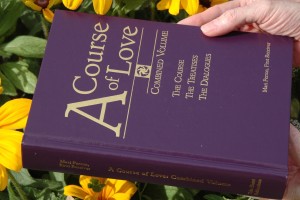Mari’s Blog
St. Louis, the end of learning, and what reveals our changes
 This is not to say that you will find this Course or the end of learning to be easy. Yet it is your difficulty in giving up your attachment to learning through the application of thought and effort that creates the perception of this Course’s difficulty. Thus it is said to you to take this Course with as little attachment to your old means of learning as is possible for you. If you do not understand, accept that you do not understand and go on. Listen to the words as if they are spoken to you, for such they are. Listen as you would listen to a friend in conversation. Listen simply to hear what is being said. Listen simply to let the words enter you. A.5
This is not to say that you will find this Course or the end of learning to be easy. Yet it is your difficulty in giving up your attachment to learning through the application of thought and effort that creates the perception of this Course’s difficulty. Thus it is said to you to take this Course with as little attachment to your old means of learning as is possible for you. If you do not understand, accept that you do not understand and go on. Listen to the words as if they are spoken to you, for such they are. Listen as you would listen to a friend in conversation. Listen simply to hear what is being said. Listen simply to let the words enter you. A.5
I went for a walk around the horn today. I saw the lady at the end of the block whose first name I do not remember but whose last name I do (go figure). I know she is the mom in a blended family and now have learned that she has had a new baby, a 10 month old girl named Delores after her husband’s grandma. As we visited she talked of the hibernation of winter concealing our changes. It felt so true.
It felt true for me. The ways in which I’ve changed are unknown to me, even while I know I’ve changed. The spring, I do believe, is going to do the revealing of the change.
After turning the corner, I saw Charlie’s family out playing basketball. He’s the boy my grandson Henry’s age and made me think of him and how he needs his “young” family now, and not to be with me so much. This is happening as I move into a more active life out in the world. Me and him too. (Change #1)
I rounded another curve where the master gardener lives and realized in a month the garden will begin to bloom. It is early March and feels like we’ve bi-passed spring and are heading for summer. Summer blue skies, mid-fifties temperatures. It seems to me that something similar happened last year and that we all awaited the one last storm that always seems to come in March, just after the snow has melted and the promise of green is already in our eyes. It didn’t come. (Change #2, early gardens and global warming)
As my “life in the world” fast approaches I feel more strongly the effects of my life outside of the world, my quiet, my not so much “chosen” as innerly-directed and necessary life of solitude. A life lived between house and cabin and taking my mom to church for weeks on end. (Change #3)
It feels ridiculously boring to mention the events that herald this change for me, and to do so for weeks on end—maybe it has even been months. One day there will be an Events page on this website that goes beyond Vegas, but I doubt I’ll ever again feel as if it means as much as it does to mention them now. They may become “the usual,” if I can take it, if I can feel like “me” as I do this stepping out, and that I can truly connect with the people I meet. The thing is . . . I do not know. I do not know what it will be like. Right now it is like a grand experiment, or in ACOL’s language, it’s a time of discovery, and a time of expressing myself newly. What the new will be, for me, feels as if it is about to be revealed.
for me, feels as if it is about to be revealed.
What I do know is that there is a feeling of momentum building, as if this is A Course of Love’s moment. As if this Course herself is coming out into the world because it is time. It is time. That’s the way it feels. (Change #4)
As this happens I’ve been having the “end of learning” come to me a lot, and before that the “end of studying.” On this website, “study group” is not used. We call the groups ACOL Groups, and speak of the ACOL Community. Jesus calls the end of learning a change of enormous proportions. It is in “A Treatise on the New” that this ending is announced.
Two changes of enormous proportion are upon you. The first is the end of learning, the ramifications of which will only slowly occur to your mind and be surprising revelations there. The second is the beginning of sharing in unity, a change that your heart will gladly accept but that your mind, once again, will be continuously surprised to encounter. T4:12.5 (Change #5)
But the end of learning is mentioned first in the Prelude:
The ego is what you made. Christ is what God made. The ego is your extension of who you think you are. Christ is God’s extension of who He is. In order to end the need for learning, you must know who you are and what this means. Where the original Course in Miracles was a course in thought reversal and mind training, a course to point out the insanity of the identity crisis and dislodge the ego’s hold, this is a course to establish your identity and to end the reign of the ego. p.8 (emphasis mine)
The establishment of our true identity will be among the topics I will share next weekend in St. Louis. St. Louis has turned out to be the inaugural event of the spring, and the first public presentation I will do since the new combined volume came out. It’s been an amazingly productive few years, really hunkering down with ACOL’s publisher Glenn Hovemann, to do not only the editing and publishing but all those infrastructure sort of things that allow for a smooth run once a time brimming with possibility spills over.
I look forward to meeting all of those I will be meeting there, and beyond St. Louis in Vegas and California. Look for an Events page soon. Here you can read the info on Saturday’s event:
http://acimstlouis.org/sites/default/files/MariPerron2016Flyer.pdf
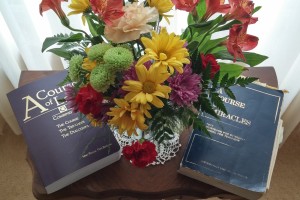
Identity crisis and a new identity
 Help is here. Be what you have been called to be. Open your dwelling place to your true Self, your true identity. Imagine this opening and this replacement occurring with every fiber of your being. Imagine the separate self being enfolded, embraced, and finally consumed—taken into the Self of union. The body of Christ becomes real through this indwelling of Christ in form. D:1.11
Help is here. Be what you have been called to be. Open your dwelling place to your true Self, your true identity. Imagine this opening and this replacement occurring with every fiber of your being. Imagine the separate self being enfolded, embraced, and finally consumed—taken into the Self of union. The body of Christ becomes real through this indwelling of Christ in form. D:1.11
Some weeks ago, I went looking for a little booklet I’d put together somewhere around 2003, a booklet called “Movement within the Course of Love Series.” As I was searching my “writing closet,” I found a piece that I’d forgotten even having written. It was a longish exploration of the “identity crisis.” I wrote about my own identity crisis in 2002 and then wrote more in 2005, looking back on what I’d gone through. This reading stayed with me, sort of niggling in the background.
Then suddenly it is Sunday morning and I’m reading the St. Paul Pioneer Press where I find Garrison Keillor on the front page of the local section due to having just hosted his final segment of ‘A Prairie Home Companion.’ Many of his guests were making return appearances and a musical ode commemorated deceased members of the show’s extended family of artists—diverse artists who were “saying a sort-of farewell to a place they’d called home since the 1970s. For two hours of live radio, Keillor presided over a show that featured equal measures of gratitude, nostalgia and benediction.”
It called me back to the idea of identity crisis as a time of endings and new beginnings.
We read of our identity crisis first in the Prelude to ACOL. There we hear of those who, through A Course in Miracles, weakened their egos, walked this world with the hope of leaving ego behind and, with miracle-minded intent, “ushered in a time of ending our identity crisis.
Not since Jesus walked the earth has such a time been upon humankind.” P.5
What gratitude I feel for ACIM and all those who, with egos weakened, led to this new time. And to Jesus who says that this time, in ACOL, we will go the rest of the way. We will identify ourselves newly. He speaks of this from the very beginning, and in Day 1 of our Forty Days on the mountain, we hear that we are newly identified.
We go beyond what can be symbolized to what can only be known within. It is to this state of grace that I call you now, today: The state of grace of the newly identified child of God. Open your heart, for the one who dwells there in union with all will emerge from this opening. What was once a tiny pinprick of light becomes a beacon as you open your heart and allow your true identity to be what is, even within your form. You are in grace and union with the Source and Cause of unity. Be no longer causeless. You and your Source are one. D:1.12-13
But we also hear of a transition we have felt ourselves to be in:
So what is it that we will now do? If I do not teach, and you do not learn, what is our continuing means for completing this transformation? As you have been shown, this will not occur by means of preparation but by means of acceptance. This will not occur by means of trying but by means of surrender. D:1.18
 There is then a long discussion on being prepared, and how we have to quit preparing. I’ve been having people tell me I needn’t prepare for my upcoming presentation at the Course in Miracles conference, a conference whose venue is quite specific and whose significance I feel deeply. Jesus specifically linked A Course of Love to A Course in Miracles. It was clearly purposeful. And now here we stand, in many ways at the end of an era, and the beginning of a new one. Fifteen years post its earliest publication, ACOL is being welcomed and accepted. We stand at a new beginning. And so I am preparing.
There is then a long discussion on being prepared, and how we have to quit preparing. I’ve been having people tell me I needn’t prepare for my upcoming presentation at the Course in Miracles conference, a conference whose venue is quite specific and whose significance I feel deeply. Jesus specifically linked A Course of Love to A Course in Miracles. It was clearly purposeful. And now here we stand, in many ways at the end of an era, and the beginning of a new one. Fifteen years post its earliest publication, ACOL is being welcomed and accepted. We stand at a new beginning. And so I am preparing.
But I am not preparing from a place where I was ten or 15 years ago when this was true for me:
Realize that all of your “concerns” are still for the personal self, a self whom you continue to believe can fail to fulfill or live your mission and your purpose. You “see” this failure occurring through ineptness of speech, through inappropriateness of attire, through lack of physical stamina, through lack of intelligence—through lack, in other words, of abilities of the personal self.” D:1.3
That could have for sure been a description of me at the time and for some years to come. And that is okay. I just need to say this. We do go through great movement in this course. We change, internally and externally. But the whole way along we are the beloved. We do the best we can at the time, and we are held and nurtured until such time as we come into our time of fullness. It’s why, I believe, so many reminders and cautions and repetitions occur throughout the course. Jesus doesn’t actually expect us to instantly change—at least not outwardly. This merging of the human and divine is a process, a route, a way. And the only thing we’re asked to do along the way is to accept ourselves.
Where I am now is accepting myself. When I heard Jesus speaking directly to my heart through my inner ear I was not called to verbalize this on the spot as some have done. Jesus came to me to put what he was saying in writing, and this is still my way. It is a creative way, and I love it. Like all those artists who participated in the farewell to ‘A Prairie Home Companion,’ I spend time in the quiet creating what I will bring into that moment of sharing with a particular people in a particular time. All that I have been and have become, all of who I am, is there in the act of creation that I am held within, only to bring it forth into a new form. As I do this, I am surrendered to the process. I do not work alone. I am guided by feelings, by new insights, by newspaper articles, by friends, by being in dialogue. More clarity arises, more ideas come, more sorting and culling happens. It is lovely.
And then when we gather, many, many will be at work in union and relationship, making that gathering too, a new creation.
So I’m just saying, none of us need to discount our way as we embrace the way of this Course. Jesus isn’t calling us to abandon ourselves, but to accept ourselves and to have the courage to be fully ourselves. Let’s not have unrealistic expectations of ourselves or others, because we are being our human selves as well as our divine selves now. We are called to accept our differences. We are called not to presume that the graces that come to us will gift us all in the same way, but to find the way that is uniquely ours.
In ACOL we move to a way of dialogue and we will, as an ACOL community, gather in dialogue, in casual and spontaneous ways—following the conference. And for 75 minutes, sometime before that, I will share what I’ve created in unity and relationship on being “All that we are” and how that will change the world.
We work together in love and unity for what can only be received in the love and unity in which we truly exist together, as one body, one Christ, one Self .D:1.27
St. Paul Pioneer Press, 1B, “A proper goodbye,” Dominic P. Papatola.
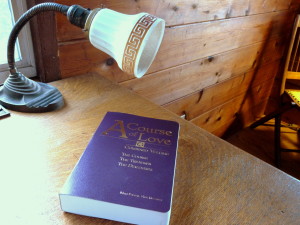
What we know not and the subtleties between creating and efforting
The embrace has returned you to attunement with the heartbeat, the music of the dance. You have not known what you do or what to do only because of fear, only because you have been out of accord with the one heartbeat. The world, the universe, is your partner—and only now do you hear the music that brings grace to all your movements, all your actions, all your expressions of love. While this may seem to be metaphorical language it is not. Listen and you will hear. Hear, and you cannot help but rejoice in the dance. C:20.34
When Jesus says “you have not known” in this paragraph, it is one of many places in which he says this in one way or another, ways always accompanied by a new choice.
I’ve been realizing lately that “I don’t know what I don’t know.” It’s such a funny thing to realize. It seems to me that there are layers and next “layers” of knowing that come to awareness, and that this happens in a way and time that I do not control. I feel this is partially due to the movement of this Course itself. While we start with the ego and vigilance regarding our false beliefs and thinking, we end on a note of having become aware of unity and letting ourselves be open to revelation. We’re no longer to put effort into coming to know, or into being ideal selves. I don’t like admitting that I continue to discover an old idea lurking here or there, but in another way I do, because to deny what I am still feeling isn’t being true. And I know Jesus wants me to be true more than he wants me to pretend perfection.
There is another kind of unknowing talked of in the Way of Mary: You know you are called to something, and something important, but it does not have a form within your mind and so you see not how it can become manifest in the world. In other words, you know not what to do. D:Day19.1
It’s there again in the practice of dialogue. Day 15 of The Dialogues, explores this practice, and within it there is a comforting message about the unknown:
Practice is the merging of the known and the unknown through experience, action, expression, and exchange. It alters the known through interaction with the unknown. It allows the continuing realization that what you knew yesterday was as nothing to what you know today, while at the same time, aiding in the realization that what you come to know has always existed within you in the realm of the unknown that also exists within you. D:Day15.23
What do we think revelation is but a coming to awareness of what we didn’t know we knew before? How does Jesus say that this happens?
What comes of unity enters you and passes through you to the world. This is the relationship 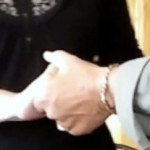 you have with unity while in form—a relationship of intersection and pass-through. 5.22 No longer will what enters you get stopped by layers of defenses. No longer will it meet the road-block of your thinking, your effort, your attempts to figure out how to do it and what it all means. . . . We are speaking here of letting your form serve union and union serve your form. This service is effortless for it is the way of creation. Again, this is why the “effort” of learning must cease. D:Day 5:21-22
you have with unity while in form—a relationship of intersection and pass-through. 5.22 No longer will what enters you get stopped by layers of defenses. No longer will it meet the road-block of your thinking, your effort, your attempts to figure out how to do it and what it all means. . . . We are speaking here of letting your form serve union and union serve your form. This service is effortless for it is the way of creation. Again, this is why the “effort” of learning must cease. D:Day 5:21-22
Effort is an old idea that I find difficult to give up. Effort can be attached to a lot more than “learning.” The effort I’m talking of is most often the effort that I rephrase for myself into an idea of creativity. In one sense, creativity could be called “effortful” but in another, creating is joyful. I feel very much in union when I’m creating. But still, my body may get tired, or I may push to go just a little further, and in those times lean into the zone of effort. The distinction between effort and many ways of “doing” can be quite subtle.
As I move into my creative zone to allow ideas to come to me for the various gatherings I will be involved in in coming months, I am aware of the subtleties that exist between creating and efforting. One of the ways I find my body responding to this is through rest. It’s really a wonderful and gentle response when I don’t fight it, and I’m becoming aware of this enough that I rarely fight it now. It occurred to me today as a good idea to bring forward, as we are all called to be creators. In responding to that call, we can pay attention to the signs and feelings that alert us to when our joy is fading and our effort emerging.
Even attending a gathering can have an effortful feel to it, so times when you’re contemplating attending a gathering are also good times to feel into the subtleties that exist between joy and effort. Having been a contemplative for years, gatherings still feel to me like a great extension of energy, and so I am careful about what, and how much I agree to do. This is also part, for each of us, of knowing and honoring ourselves and those subtleties.
I’ve been putting information about these gatherings into each of my blogs for a while, but these notices are not meant as pressure, only as invitation. If you would like to find information on gatherings you may want to participate in, please visit: A Course of Love Facebook Page
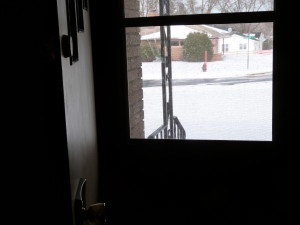
Entering and being entered
These words of love...
do not enter your body through your eyes and take up residence in your brain, there to be distilled into a language that you can understand. As you read, be aware your heart, for this is where this learning enters and will stay. Your heart is now your eyes and ears. Your mind can remain within your concept of the brain, for we bypass it now and send it no information to process, no data for it to compute. The only change in thinking you are asked to make is to realize that you do not need it. C:3.14
Here in Minnesota, a homeowner is very inconvenienced by not having a porch or front hallway. At this time of year, it is nearly essential, especially if you are going to have more than one or two people visiting, that you have such a place and a rug for feet and a mat for boots. Churches have vestibules, hotels and theaters have lobbies, great houses have foyers, shopping malls their double doors.
When I was young, although we had a porch, it was the back door that got used. At the backdoor, surrounded by rag rugs, one entered onto a floor covered by a sheet or role of linoleum, or squares of tile in combination primary colors of which red and white and green were most common.
Even a piece of writing needs an entry point. It’s what I love about the style of writing that has become common to the blog. A predecessor to the blog style might be the “column,” where the non-editorial view of the columnist, rather than the view of the paper or the five W’s (who, what, when, where, why), is the reason for the writing and the reading.
In my view, there is always an entry point to writing, even if it’s not shared. In a similar way there is an entry point for all that is given from unity, and a way that we enter into relationship that is essential to our acceptance of our givens.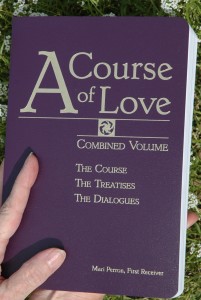
In Learning in the Time of Christ, Jesus says, “Listen simply to let the words enter you.” (A.5) And in C:3.9:… “these words enter you as what they are, not the symbols that they represent.”
Also in Learning in the Time of Christ (Jesus’ guide to ACOL, the Appendix in the combined volume): “I ask you only to pause, to give the mind a rest, to enter a realm foreign to the mind and yet beloved to the heart. (A.12) We hear that in The Dialogues, “You have entered the final stages of revelation of Who You Are.” (A.42) We’re also told that ideas enter us. “The idea of unity and relationship must fully enter you now.” (A.41)
The idea of “entry” came to me because yesterday, I hosted a brunch for my family. At the end of the day, as I readied myself to sit down to write, I noticed the entryway, now devoid of shoes, boots and coats, yet showing signs still of the coming and the going. As I sat down, I found I was too tired to actually write, but the idea gestated overnight. And so I want to suggest that like with a writing idea, what “enters us” is not necessarily known to us or complete as it arrives. Sometimes it arrives by the back door. But always, there is an interaction that occurs to bring what enters us—whether as ideas, or states of being, into their fullness.
I love this sense of “entering into” and of “being entered,” and I believe that these often repeated words are calling for our attention. As Jesus concludes The Course, he reminds us that an engagement with life is required: “This engagement is a promise, a commitment. It requires participation, involvement, attention, being present.” (C:24.4)
If you would like to participate in an ACOL event (St. Louis in March, ACIM Conference in April), please see A Course of Love Facebook Page
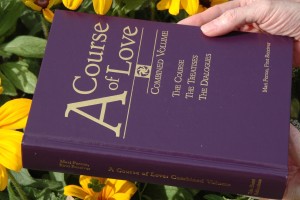
Experiencing “more” of what we are
To have experienced only separation is to have known only half of any experience.
After I completed A Course of Love, what consumed me for a long while was a desire to understand my own experience. I don’t remember precisely when this began, and admit there may have been varying stages of it. But I’ve recently revisited some of the books that helped me explore this when it was an ardent question.
My quest then was not to understand “the book” and what it said, but my experience of “receiving” the course. As you are each “receivers” too, I hope you can relate, because the extraordinary thing I’ve been seeing since then, is that A Course of Love simply is an experience. In some ways, we don’t know what to make of ACOL because it will not stay contained within its own pages. It moves out into our lives and moves our lives along in ways we could never have foreseen.
I’m moving into a time of adding to my experiences. New experiences await. You’ may have heard that I’ll be in Vegas for the ACIM Conference, (details of which can be found on ACOL’s website), but I’ve received an additional invitation to speak in St. Louis next month. ACIM St. Louis will hold the event March 12, from 10-4. Here’s a link to the flyer for the event: http://acimstlouis.org/sites/default/files/MariPerron2016Flyer.pdf
I am in the midst of what I’m calling my “Yes” year. I am going to give my all to some new experiences and see how they suit me. The gentleman who contacted me about St. Louis said he’d heard I was a bit of a recluse and I was secretly quite pleased. I am a bit of a recluse. What will a more active, and interactive life feel like?
I’ll report back about ten months from now!
In the meanwhile, I took a look at some of the ways the word experience, mentioned more than 500 times in ACOL, was used. Here are a few:
C:18.10 The only way to make the unbelievable believable is to alter what you experience.
T4:1.25 All have become aware that a new experience awaits and that they stand at the threshold of choice.
In Day 28 Jesus says that our time on the mountain provided “The experience required in order to realize a new possibility.”
The following quote may best describe the difference I was attempting to realize—almost as if you can’t see the new experience alone, but only in contrast to what was. We know union as a new experience because of the experience of separation that was once all we knew:
Day 31.5 To have experienced only separation is to have known only half of any experience, to have seen every experience in only one dimension—in short, to have seen experience as happening to you rather than as you. By realizing the unity of the relationship in which experience becomes manifest, you not only realize oneness, but realize that you are a creator and that you always have been.
I’ve described receiving in many ways over the years, and I know that to think of it only as  receiving the words of this course would be terribly limiting. I know that receiving is not about seeking, but being sought. It is there in thousands of ways, ways that wait for us to be receptive to what is constantly given. It is a re-connection to our givens. (To re-connect, by the way, is the original sense of meaning of the word religion.)
receiving the words of this course would be terribly limiting. I know that receiving is not about seeking, but being sought. It is there in thousands of ways, ways that wait for us to be receptive to what is constantly given. It is a re-connection to our givens. (To re-connect, by the way, is the original sense of meaning of the word religion.)
I bring this up partially because I want to share this stunning quote from R. D. Laing. His book The Politics of Experience was one of my sources of exploration.
“What we think is less than what we know; what we know is less than what we love: what we love is so much less than what there is. And to that precise extent we are so much less than what we are . . . .”
With the experience of A Course of Love, we are becoming “more” of what we are. Alleluia!




